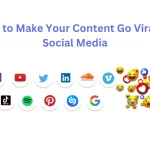Viral marketing is a technique where a marketing message spreads quickly from person to person, typically through social media platforms, emails, or word of mouth. It is called “viral” because it replicates the spread of a virus, with one person sharing the message with others, leading to a cascading effect. While it can be a powerful tool for businesses, it also comes with risks. Let’s explore the pros and cons of viral marketing.
Pros and Cons of Viral Marketing
Every action has a reaction. That’s also real for viral marketing. Here we are sharing some pros and cons of viral marketing.
Pros of Viral Marketing
Let’s dive into the pros of viral marketing
1. Low Cost
Viral marketing can be cost-effective because it leverages organic sharing to spread a message. Traditional marketing often requires significant investment in advertising space, airtime, or other promotional activities. In contrast, viral marketing relies on users sharing content within their networks, reducing the need for paid promotion. The initial cost to create and launch a viral campaign might be low, and if it gains traction, the subsequent reach is largely driven by organic sharing.
2. High Reach
Viral marketing has the potential to reach a vast audience quickly. When content resonates with users, they share it with friends and followers, leading to exponential growth in visibility. Unlike traditional advertising, which requires ongoing investment to maintain reach, viral marketing can spread organically, reaching audiences far beyond a business’s typical demographic. This reach can also cross geographical boundaries, allowing brands to gain international exposure.
3. Increased Brand Recognition
A successful viral campaign can significantly boost a brand’s recognition and visibility. As the content is shared and discussed, it creates a buzz around the brand, raising its profile. Increased brand recognition can lead to improved brand loyalty and a stronger customer base. When people are exposed to a brand through a viral campaign, they are more likely to remember and consider it when purchasing.
4. Engagement and Interaction
Viral campaigns often encourage high levels of engagement and interaction. This can come in the form of comments, likes, shares, and user-generated content. When people engage with a brand in this way, it can create a sense of community and foster a closer relationship between the brand and its customers. User-generated content, such as memes, videos, or testimonials, can further enhance the reach and impact of a viral campaign.
5. Possibility of Rapid Growth
A successful viral marketing campaign can lead to rapid growth in various areas. This can include a surge in website traffic, social media followers, and product sales. This rapid growth can provide businesses with valuable opportunities, such as increased brand partnerships, sponsorships, and new customer acquisitions. The speed at which a viral campaign can impact a business is one of its most attractive features.
Cons of Viral Marketing
Let’s explore the cons or drawbacks of viral marketing in detail:
1. Lack of Control
When a campaign goes viral, controlling the narrative and message can be challenging. Unlike traditional marketing, where you can manage the content’s distribution and messaging, viral marketing relies on organic sharing. This means the content can be interpreted in unexpected ways, leading to unintended consequences. The rapid spread of viral content can make it hard to correct misinformation or negative perceptions once they’ve taken root.
2. Short-Lived Attention
Viral marketing often creates a burst of attention that can be fleeting. While a successful viral campaign can generate significant buzz, the excitement can quickly fade. Businesses may struggle to maintain momentum and convert the temporary attention into long-term customer loyalty or sustained interest. Once the viral phase ends, the impact on brand visibility and engagement may diminish, requiring additional marketing efforts to stay relevant.
3. Risk of Negative Backlash
Viral marketing can be a double-edged sword. If the content is perceived as offensive, insensitive, or inappropriate, it can lead to a strong negative reaction from the public. This backlash can damage a brand’s reputation, leading to public relations crises and, in severe cases, loss of customers. The fast spread of viral content can amplify negative reactions, making it difficult to contain or mitigate the damage.
4. Difficulty in Predicting Success
The success of viral marketing is inherently unpredictable. While businesses can design campaigns with viral potential, there’s no guarantee that a campaign will go viral. Factors like timing, platform algorithms, and audience trends can influence a campaign’s success. This uncertainty makes it risky for businesses to rely solely on viral marketing for their strategy, as the results can vary significantly.
5. Potential for Legal Issues
Viral marketing can pose legal risks if not managed carefully. If a campaign uses copyrighted material without permission, violates privacy laws, or contains offensive or discriminatory content, it can lead to legal complications. Businesses must ensure their viral campaigns comply with legal regulations and respect intellectual property rights to avoid lawsuits or regulatory penalties.
Also Read


Can Viral Marketing Make Brand Success
Viral marketing can contribute to a brand’s success, but it’s not a guaranteed path. Let’s explore how it can make a brand successful, as well as the factors that influence this success:
How Viral Marketing Can Drive Brand Success
1. Rapid Brand Awareness
Viral marketing can quickly bring a brand into the public eye. When a campaign goes viral, it can reach millions of people in a short time, dramatically increasing brand awareness. This kind of rapid exposure can be invaluable, especially for startups or smaller businesses looking to establish themselves.
2. Cost-Effective Promotion
Viral marketing often involves organic sharing, reducing the need for expensive advertising campaigns. If a campaign gains traction, it can continue to spread without significant additional investment, providing a high return on investment (ROI).
3. Strong Customer Engagement
Viral campaigns can create high levels of engagement and interaction, fostering a sense of community around the brand. This can lead to stronger brand loyalty, with customers who are more likely to advocate for the brand and make repeat purchases.
4. Expanded Market Reach
A viral campaign can reach audiences beyond a brand’s traditional market. This expanded reach can lead to new customer segments and even international exposure, providing opportunities for growth and expansion.
5. Enhanced Brand Personality
Viral marketing often involves creative, humorous, or emotionally resonant content. This can help humanize a brand and create a unique personality, making it more relatable to consumers. A strong brand personality can set a company apart from its competitors.
Factors Influencing Viral Marketing Success
While viral marketing has the potential to drive brand success, several factors play a role in determining its effectiveness:
- Quality of Content: The content must be compelling, shareable, and resonate with the target audience. It could be funny, emotional, informative, or surprising—anything that compels people to share it with others.
- Timing and Platform: The campaign’s timing and the platform’s choice can significantly impact its success. Trends, current events, and platform algorithms can all influence a campaign’s reach.
- Brand Alignment: The campaign should align with the brand’s values and message. Misalignment can lead to confusion or backlash.
- Risk Management: Brands should be prepared to handle negative reactions or legal issues. A clear plan for crisis management and legal compliance is crucial.
- Follow-Up Strategy: To convert the initial buzz into long-term success, brands need a strategy for sustaining engagement and building customer relationships.
End Words
Viral marketing can be an effective way to reach a large audience quickly and at a low cost. However, its unpredictability and potential risks require careful planning and consideration. To maximize the benefits and minimize the drawbacks, businesses should ensure their campaigns align with their brand values, are sensitive to their audience, and comply with legal requirements. By doing so, they can harness the power of viral marketing while avoiding the pitfalls.

